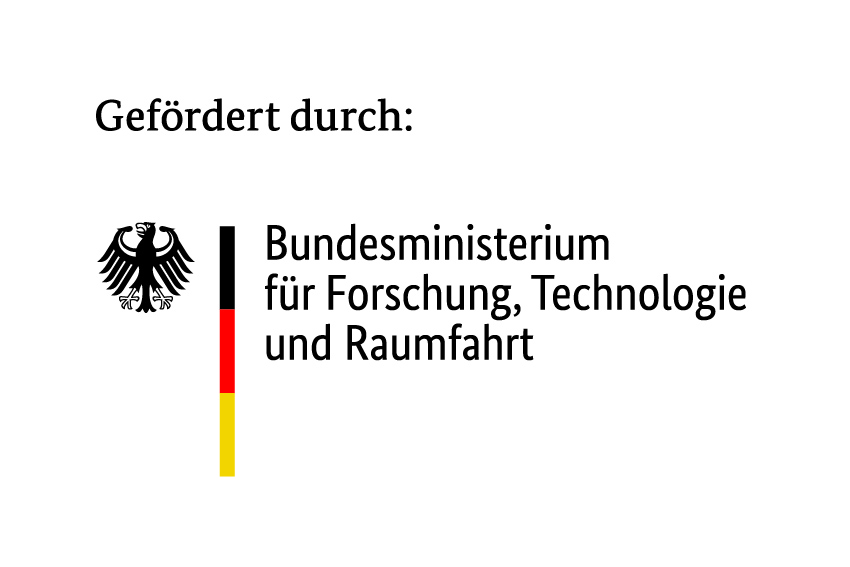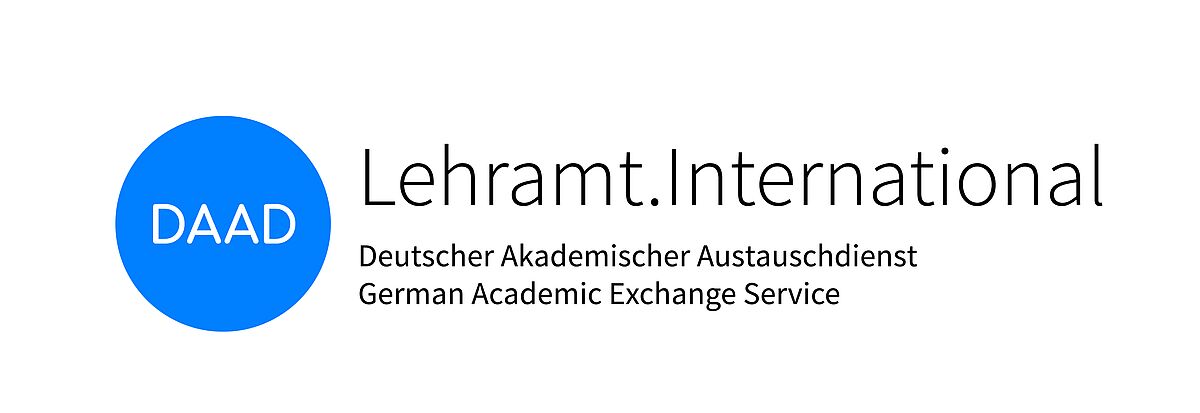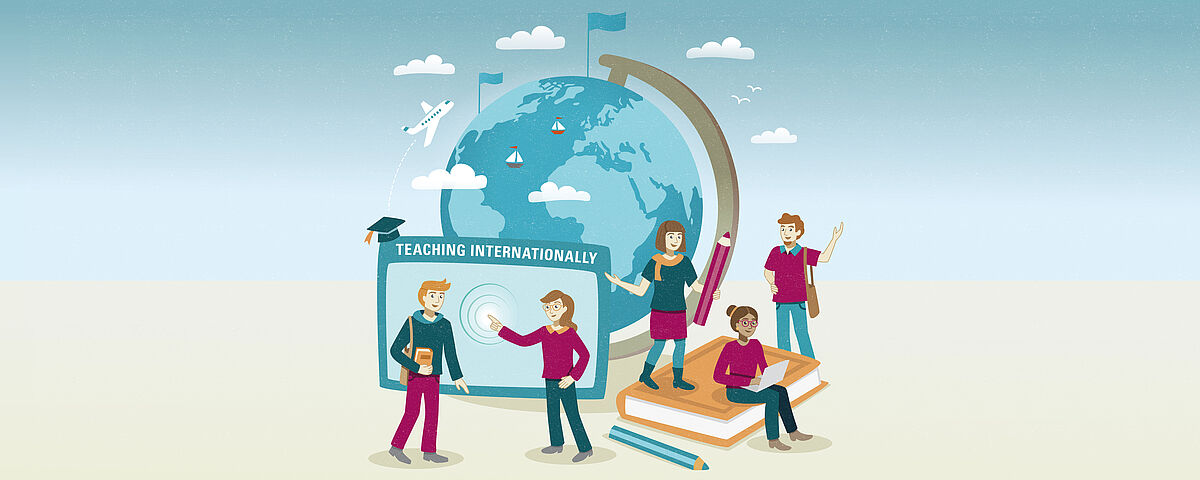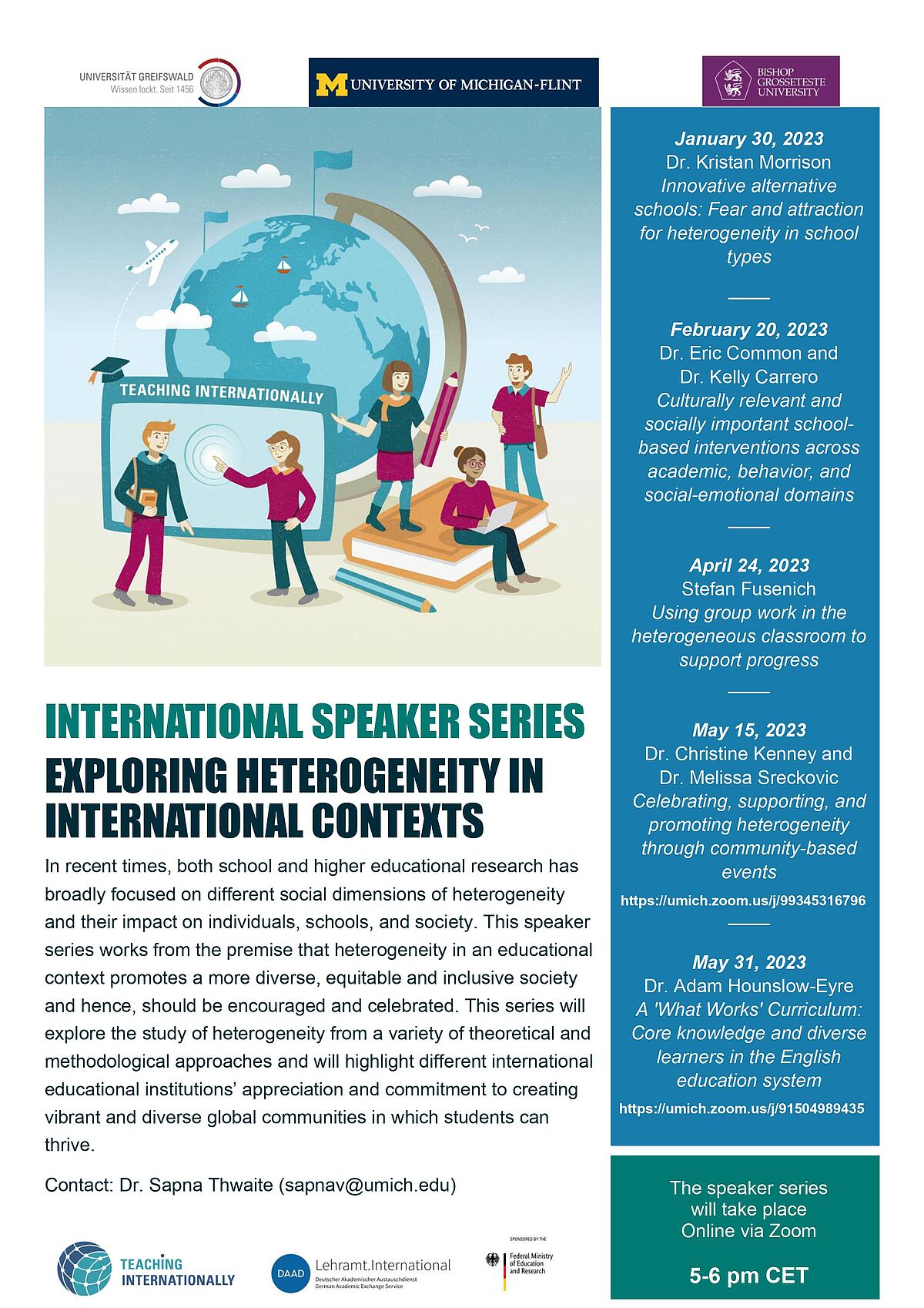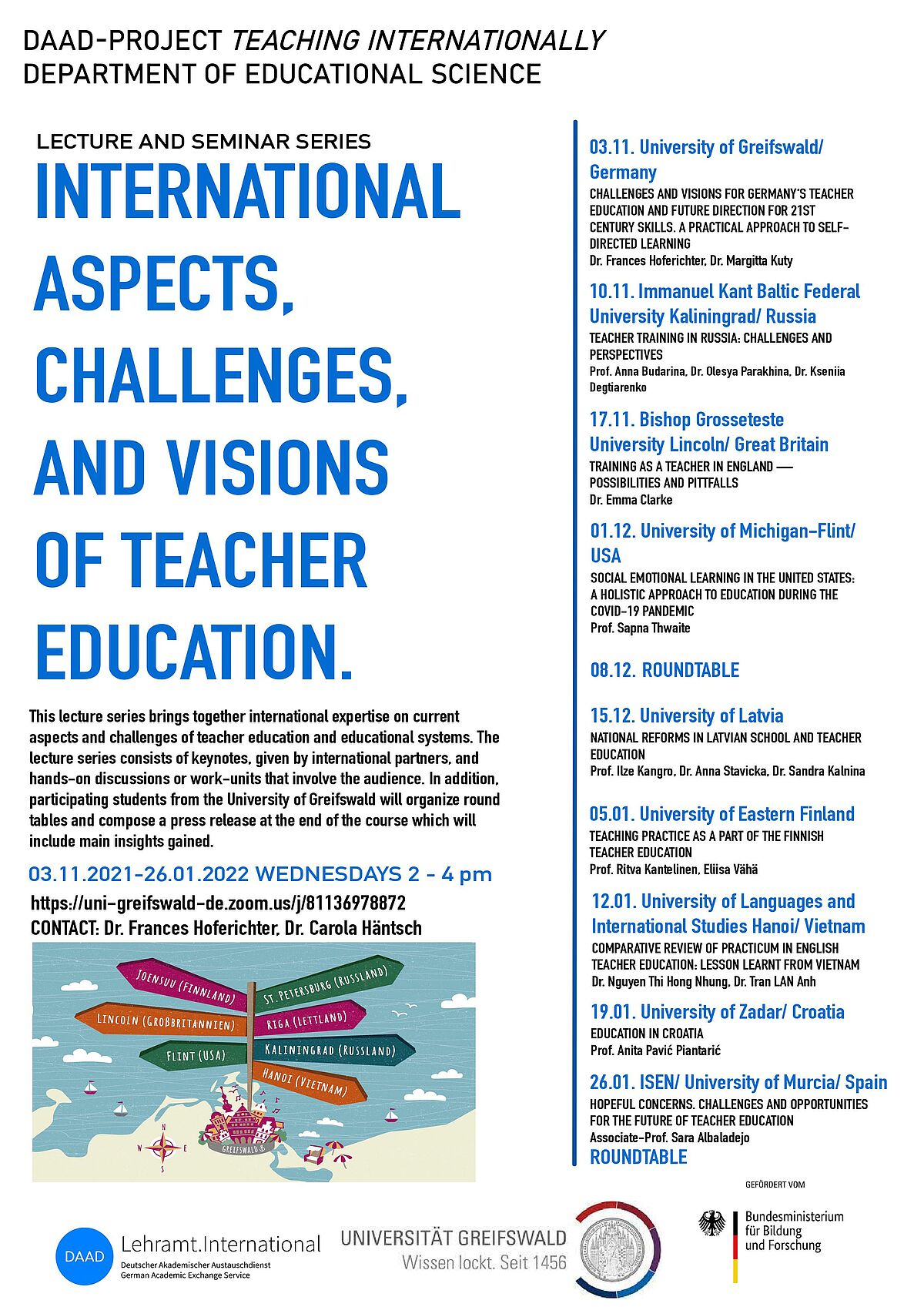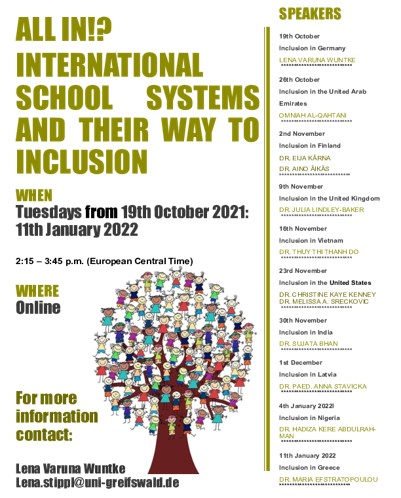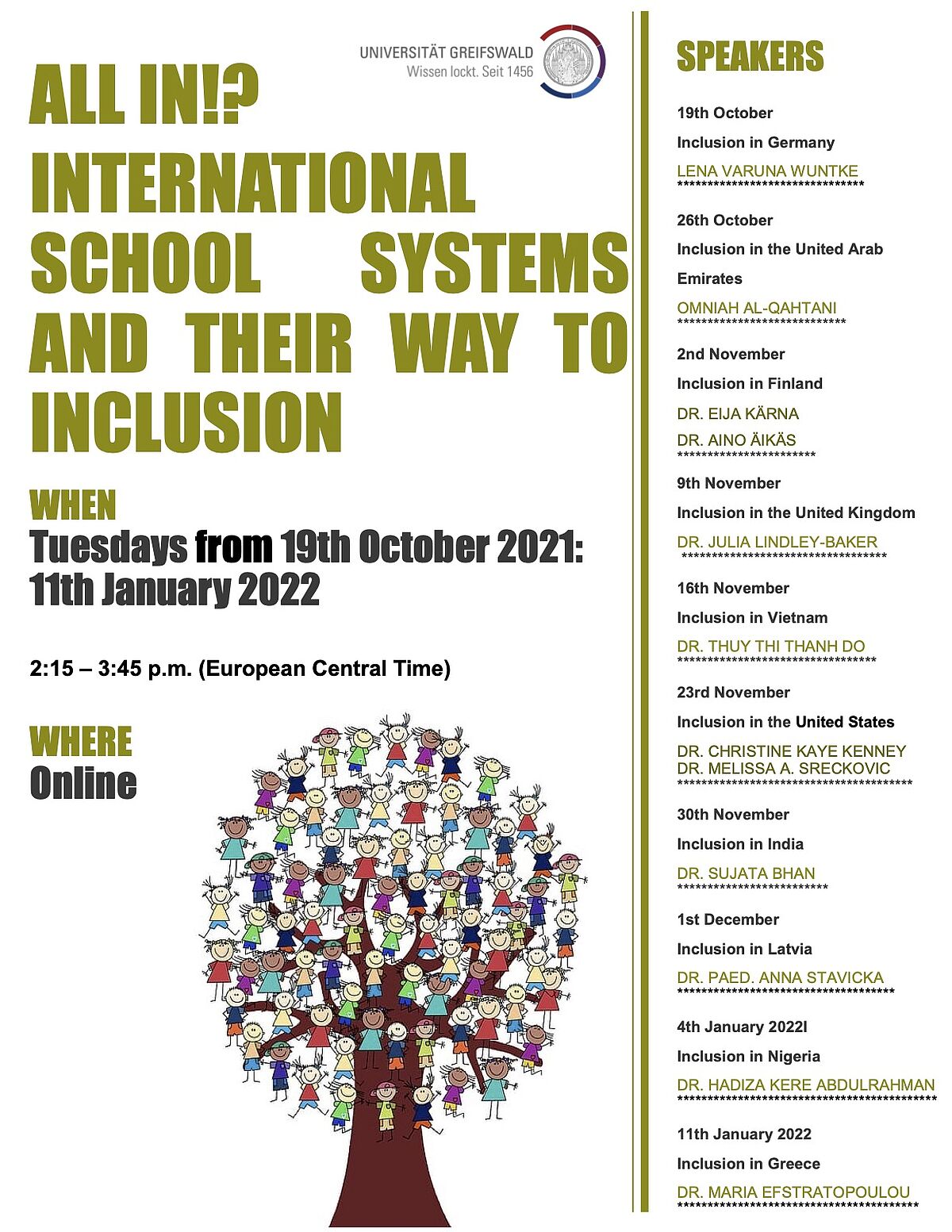Im akademischen Jahr 2023 wurden an der UG im Rahmen des Projekts mehrere Gastvorträge angeboten.
Exploring Heterogeneity in International Contexts
In recent times, both school and higher educational research has broadly focused on different social dimensions of heterogeneity and their impact on individuals, schools, and society. This speaker series works from the premise that heterogeneity in an educational context promotes a more diverse, equitable and inclusive society and hence, should be encouraged and celebrated. This series will explore the study of heterogeneity from a variety of theoretical and methodological approaches and will highlight different international educational institutions’ appreciation and commitment to creating vibrant and diverse global communities in which students can thrive.
January 30, 2023, 5-6pm (CET) - Dr. Kristan Morrison (Greifswald/Radford)
February 20, 2023, 5-6pm (CET) - Dr. Eric Common and Dr. Kelly Carrero (Flint/Texas)
April 24, 2023, 5-6pm (CET) - Stefan Fusenich (Lincoln)
May 15, 2023, 5-6pm (CET) - Dr. Christine Kenney and Dr. Melissa Sreckovic (Flint)
May 31, 2023, 5-6pm (CET) (NEW DATE) - Dr. Adam Hounslow-Eyre (Lincoln) Join the session
Speaker Series Part 1 - 30.01.2023
Innovative alternative schools: Fear and attraction for heterogeneity in school types - Dr. Kristan Morrison
Dr. Morrison explores with the attendees the question of whether or not societies (German and American) accept a broad array of innovative alternative schools as legitimate forms of education. She particularly focuses on democratic free schools, which are founded on a philosophical approach in which the students, teachers, administrators, and other participants have equal rights and power of decision-making about almost all issues of school governance and personal educational matters. She provides some examples of how she teaches about these schools and explores her students’ (pre-service and in-service teachers) reactions to them – both their attractions to and fears of them. She ends by posing the question of whether we can get to a point of valuing the heterogeneity of school types in the same way we have come to value heterogeneity about human differences within a school.
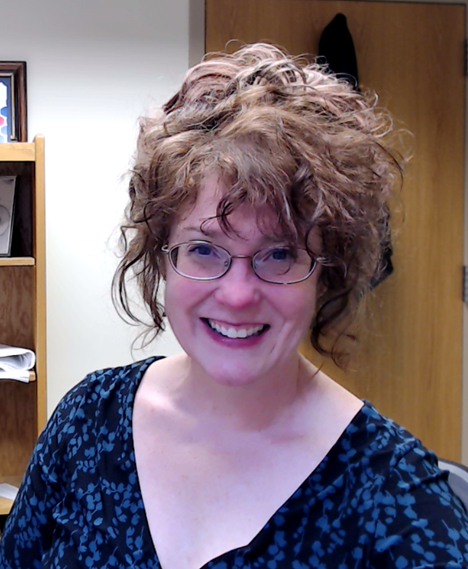
Dr. Morrison is a Professor in the School of Teacher Education and Leadership at Radford University in Radford, VA, US. She received her PhD in the Foundations of Education from the University of North Carolina at Greensboro, a Master of Arts in History and a Master of Arts in Education both from Wake Forest University, and a Bachelor of Arts in History and Sociology from Westminster College (Pennsylvania). She is currently serving as a Visiting Professor at the University of Greifswald in Germany where she is teaching about educational alternatives and doing field work with Greifswald students at a democratic free school in Mecklenburg-Vorpommern, Germany. She has studied such schools and self-directed homeschooling (“unschooling”) in the US and internationally and is always intrigued by pre-service teachers’ reactions to the theory and reality of these forms of education.
Presentation
Speaker Series Part 2 - 20.02.2023
Culturally relevant and socially important school-based interventions across academic, behavior, and social-emotional domains - Dr. Eric Common and Dr. Kelly Carrero
Dr. Carrero and Dr. Common explore how strategies, practices, and programs across teaching can be socially and culturally valid. Social validity refers to how well practices/assessments are perceived and accepted by everyone involved, such as students, parents, and teachers. Relatedly, cultural validity refers to how well practices/assessments align with the cultural beliefs, values, and practices of everyone involved--in a world of multiple and overlapping identities, cultures, and communities. Both are important in supporting students and communities for success within and beyond the classroom walls.
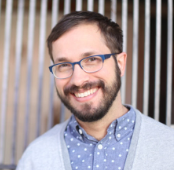
Eric Alan Common, Ph.D., BCBA-D, LBA, MI is an Assistant Professor in the Education Department at the University of Michigan - Flint. Dr. Common’s background is in special education and applied behavior analysis. He is interested in the active role ‘schooling’ plays in child development and the complex phenomena of learning—across academic, behavior, and social-emotional domains. His research examines whole-child initiatives delivered in schools using Comprehensive, Integrated, Three-Tiered (Ci3T) model of prevention and culturally and socially valid applied behavior analytic services.
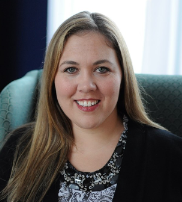
Kelly M. Carrero, Ph.D., BCBA, LBA-TX is an Associate Professor with tenure in the Psychology & Special Education Department at Texas A&M University—Commerce. She has served culturally and linguistically diverse children and youth with exceptionalities and behavioral concerns in a variety of settings. Her research projects serve as a vehicle for positive social change and advocacy for children identified with exceptionalities and challenging behaviors (including Autism Spectrum Disorders). Specifically, she is interested in identifying and examining culturally responsive and socially valid practices in research practices and service delivery. Dr. Carrero serves her profession as a reviewer for several journals and an active member of the Council for Exceptional Children (CEC) and its respective divisions.
Presentation
Speaker Series Part 3 - 24.04.2023
Using group work in the heterogeneous classroom to support progress - Stefan Fusenich
Stefan Fusenich's presentation examines the use of group work to manage the heterogeneous classroom. Within this session he will discuss how diverse students (for example, students that have learning disabilities and students who are gifted) can be included and not just integrated into the classroom though effective planning and scaffolding of group work, considering Marzano, Pickering and Pollocks research on effective learning in groups and more recent work by Werth on 'grouped to achieve'.
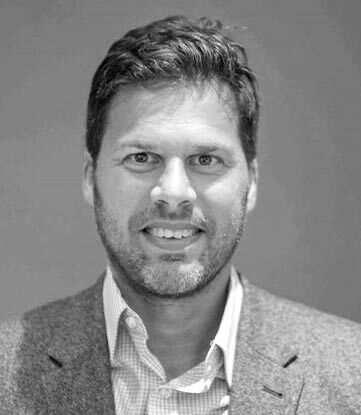
Stefan Fusenich is a teacher educator and DfE subject learning coach (advanced practitioner). Stefan has extensive management and teaching experience across various posts in education and is a qualified lecturer with Qualified Teacher Learning and Skills status. He previously worked with the Learning and Skills Improvement Service as a critical friend, and on capacity building projects with schools, training providers and colleges in the UK and abroad.
Stefan has experience of teaching and management across a range of vocational and academic courses and has held senior posts as a head of department, student support manager, advanced teaching and learning coach, programme leader and observation team leader. He has particular expertise in Post 16 curriculum development, responsive teaching, assessment, progress and value added.
Presentation Suggested Article
Speaker Series Part 4 - 15.05.2023
Celebrating, supporting, and promoting heterogeneity through community-based events - Dr. Christine Kenney & Dr. Melissa Sreckovic
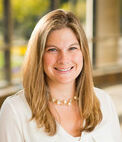
Dr. Christine Kenney is an associate professor of Education in the School of Education and Human Services at the University of Michigan-Flint. She is also currently serving as the Chair of the Education Department. She received her PhD from the University of Michigan-Ann Arbor in the area of literacy, language and culture. She earned a Masters of Arts in Early Childhood Education and Bachelor of Arts in Special Education from Eastern Michigan University. Her current scholarship involves the examination of effective inclusive practices through community partnerships.
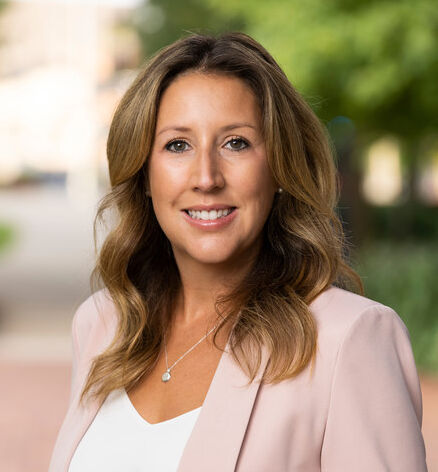
Dr. Melissa Sreckovic is an associate professor of Education and is currently serving as the Honors Program Director at the University of Michigan-Flint. She received her PhD in Special Education from the University of North Carolina at Chapel Hill, her Master of Arts in Special Education and Literacy and her Bachelor of Arts in Elementary Education from Michigan State University. Her current scholarship is focused on identifying and examining the efficacy of practices to promote the authentic inclusion of autistic individuals in schools and communities.
Presentation
Speaker Series Part 5 - 31.05.2023
A 'What Works' Curriculum: Core knowledge and diverse learners in the English education system - Dr. Adam Hounslow-Eyre
Dr. Adam Hounslow-Eyre's presentation examines the impact of the thought of E. D. Hirsch and the concept of core knowledge in the most recent revision on the English National Curriculum. These developments are contextualised and critiqued by a consideration of the development of ‘what works’ and evidenced based practice in English schools that is perhaps ‘insensitive’ to the heterogeneity of learners.
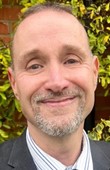
Adam Hounslow-Eyre PhD, PGCE, fHEA, FCCT is Deputy Head of Programmes for Education, Health and Lifelong Learning and Programme Leader for Education Studies at Bishop Grosseteste University in Lincoln, England (UK). Adam was a Primary School (ages 5 -11) Teacher and Headteacher for approximately 20 years, increasingly specialising in working in small rural or semi-rural schools with mixed age classes. He qualified as a Critical Skills Programme trainer, delivering training nationally across the United Kingdom and adopted the active learning and humanistic approach in his own teaching. Adam was a regional coordinator for the Cambridge Primary Review Trust’s research into Primary Education (the biggest such national research report since the Plowden Report). Adam also contributed to the English Government’s consultation on developing the Primary National Curriculum in Computing. His research background and interests are in the philosophy of education; particularly the call for ‘what works’ education research and pedagogy, process philosophy and embodied cognition. He also researches on the impact of digital technology and computing in schools.
Vergangene Veranstaltungen
Im akademischen 2021/2022 wurden vom Institut für Erziehungswissenschaften zwei internationale Lehrveranstaltungen angeboten.
Lehramtsausbildung weltweit
Durch die Betrachtung aktueller Themen und Herausforderungen von Bildungssystemen weltweit, sollen in dem Seminar "International aspects, challenges and visions of teacher education" gemeinsame Visionen für eine Weiterentwicklung des Bildungssystems auf nationaler und internationaler Ebene entwickelt werden. Dozierende von internationalen Partnerhochschulen geben mit einer Keynote den Anstoß für eine Diskussion und stellen Best Practice Beispiele aus Ihren jeweiligen Ländern vor. Anschließend wird diskutiert, wie vielversprechende Strukturen und Methoden für eine innovative Schulumgebung in allen Ländern übernommen werden können.
International Aspects, Challenges, and Visions of Teacher Education
This seminar brings together international expertise on current aspects and challenges of educational systems in e.g., Finland, Russia, U.S.A., Great Britain. Various international partner Universities will share their insights and develop common visions to improve the educational system on both the national and global level. We will discuss the questions of “What skills do students need in the 21st century and what does it take to support our students on their way to become responsible, creative, and courageous global players?” We will learn about “best practice” scenarios around the world and discuss how we can adopt promising structures, methods, and settings to innovative school settings.
The seminar consists of keynotes, given by international partners, and hands-on discussions or work-units that involve all participants of the seminar. In addition, participating students from the University of Greifswald will organize round tables and compose a press release at the end of the course which will include main insights gained as well as formulate demands to the Ministry of Education.
Inklusion weltweit
In dem Seminar "All In!? International school systems and their way to inclusion" beschäftigen sich die Teilnehmer*innen mit dem Thema Inklusion in Deutschland und weltweit. Unter dem Aspekt der Inklusion werden Bildungssysteme in verschiedenen Ländern betrachtet und verglichen, um Parallelen und Differenzen zu identifizieren, aus denen sich dann wiederrum mögliche gemeinsame Potentiale und Herausforderungen ableiten lassen. Pädagogen aus aller Welt (Großbritannien, Vietnam, Lettland, USA, Indien, Griechenland, Nigeria) werden das Seminar mit ihrem Input bereichern und damit eine internationale Sicht auf den aktuellen Stand und die weltweiten Herausforderungen im Bereich der Inklusion bieten.
All in?! International School systems and their way to Inclusion
Inclusive education opens up fair opportunities for educational justice for all children and young people — regardless of social and ethnic background, gender, special needs or other factors. At the same time, inclusion is considered one of the biggest challenges in the German school system. How about other countries?
In the lectures series "All in!? International school systems and their way to inclusion", school education systems in different countries around the world will be presented on the aspect of inclusion in the fields of special educational needs. Among other things, the concept(s) and understanding of inclusion, the historical development, legal foundations, framework guidelines and the implementation of inclusion in the various school systems will be addressed.
What parallels and differences can be identified?
And what (common) opportunities and challenges will the international school landscape face in the coming years?
Im akademischen Jahr 2021/2022 wurden an der UG im Rahmen des Projekts jeweils zwei Workshops für Studierende und Lehrende angeboten.
Intercultural teaching
Dieser Workshop bietet eine Einführung in die interkulturelle Lehre und Lernstile. Vertiefend wird analysiert, welche Rolle kulturelle Wertevorstellungen dabei für Lehrkräfte und Studierende spielen. Neben einer kritischen Betrachtung des Kulturbegriffs, werden kulturelle Einflüsse auf Wahrnehmungen und Erwartungen sowie unterschiedliche Kommunikationsstile analysiert.
Wann: 06.12.2021, Online
Interkulturelle Kompetenzen stärken
Interkulturelles Lernen ist mittlerweile in nahezu jedem Lehrplan eine Querschnittsaufgabe, womit das Entwickeln und Fördern von interkulturelle Kompetenzen bei Schülerinnen und Schülern eine zunehmend wichtigere Aufgabe von Lehrkräften darstellt. Um jedoch das interkulturelle Lernen bei Schülerinnen und Schülern zu fördern, müssen sich Lehrkräfte der eigenen (inter-) kulturellen Identität bewusst werden und die eigenen interkulturellen Kompetenzen reflektieren und stärken.
Der Workshop bietet Lehramtsstudierenden die Möglichkeit, verschiedene Modelle zur interkulturellen Kompetenz kennenzulernen, welche später auch für den Klassenraum genutzt werden können. Der Workshop bietet zudem Raum, um interkulturelle Übungen und Spiele gemeinsam auszuprobieren und darüber zu reflektieren, wo und wie sie im Schulalltag eingesetzt werden können.
Wann: 30.11.2021, Online
Working in international teams
Dieser Workshop vertieft, welche Rolle kulturelle Wertevorstellungen für die Zusammenarbeit in interkulturellen Teams spielen und wie eine gute Zusammenarbeit aktiv gefördert werden kann. Dafür lernen die Teilnehmer*innen Teamprozesse zu verstehen und positiv zu gestalten sowie Strategien zu entwickeln, um die Zusammenarbeit in interkulturellen Teams zu stärken.
Wann: 03.11.2021, Online
Interkulturelle Sensibilisierung & Umgang mit Vielfalt
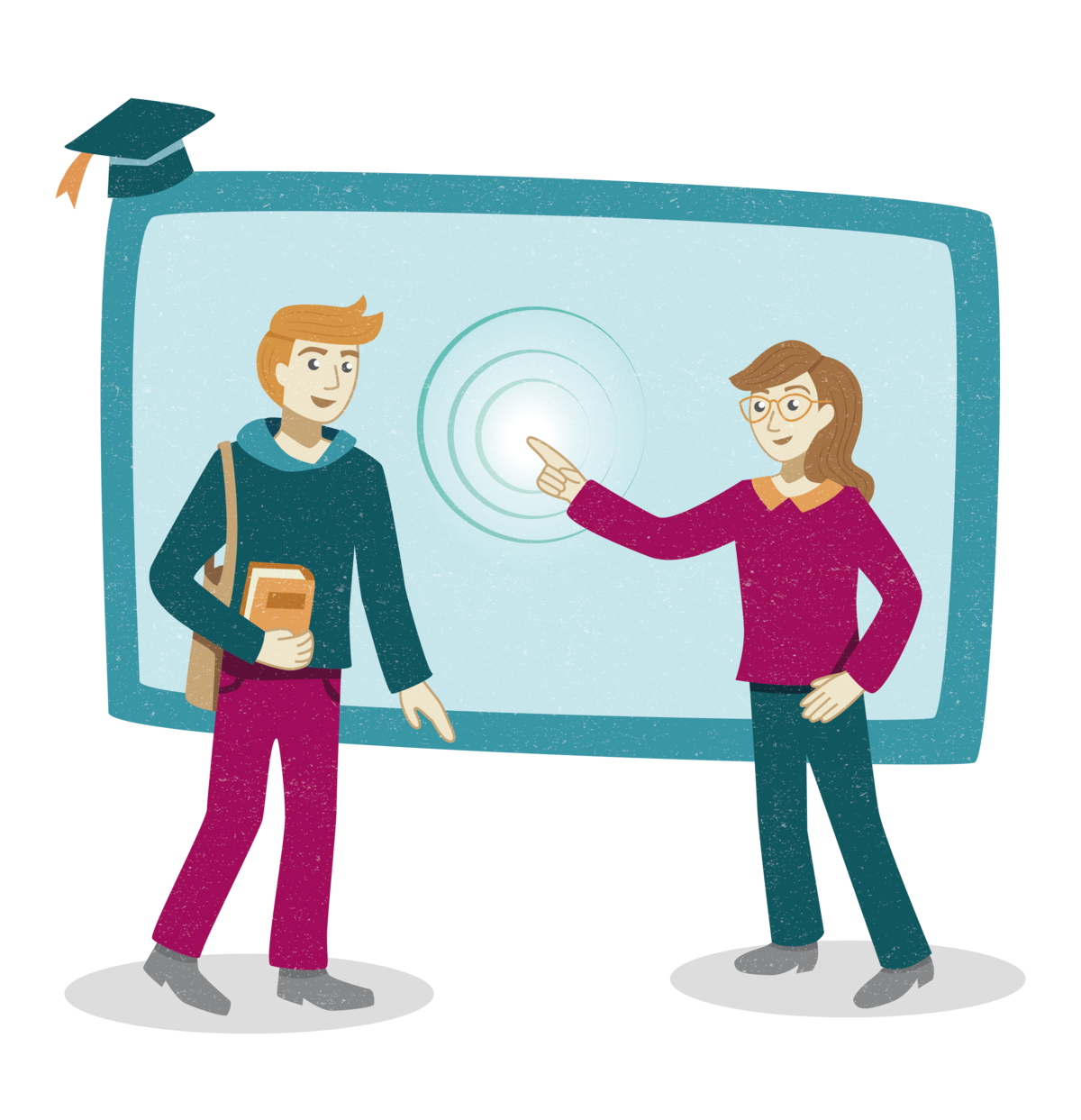
Im Vordergrund des Workshops stehen ein fundiertes Verständnis für die Potenziale und Herausforderungen im Umgang mit Vielfalt und Interkulturalität in der Lehre sowie die Sensibilisierung für Diversität und Interkulturalität im Kontext der Arbeit mit heterogenen Schüler*innengruppen. Außerdem wird gemeinsam an einer Best Practice für eine kultursensible und diversitätsorientierte Lehre gearbeitet.
Wann: 01.11.2021, Online
